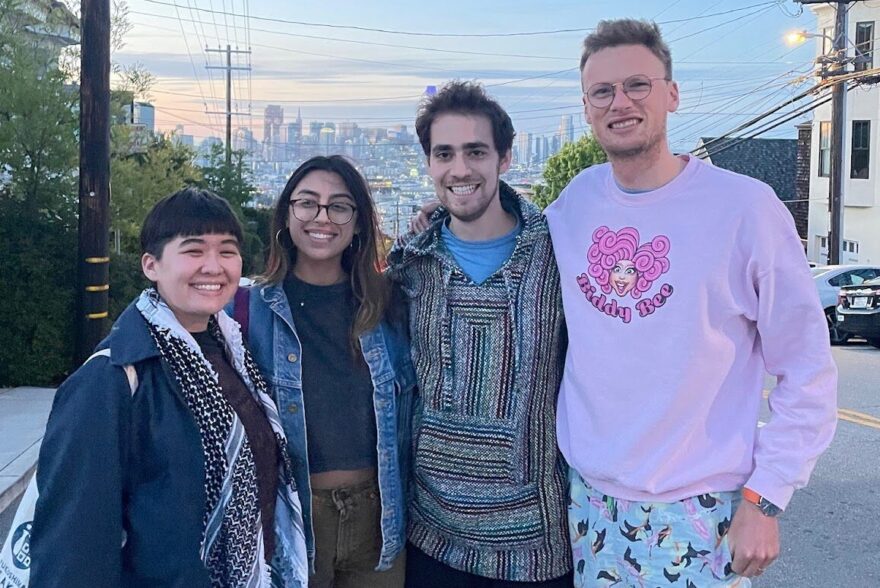Applying Indigenous Values to Philanthropy


The Dollar a Day Fund isn’t your typical funder. It has no board, no application or reporting requirements for its Indigenous grantees, and no agenda (other than to increase resources for Indigenous communities). Why? Because, as Yisroel Quint, Dollar a Day Founder, shares, “Indigenous organizations don’t need another layer of bureaucracy to get funding.”
Written by: Saraya Hamidi, Indigenous Partnerships Manager
The Dollar a Day Fund isn’t your typical funder. It has no board, no application or reporting requirements for its Indigenous grantees, and no agenda (other than to increase resources for Indigenous communities). Why? Because, as Yisroel Quint, Dollar a Day Founder, shares, “Indigenous organizations don’t need another layer of bureaucracy to get funding.”
For the past two years, Blue Forest has worked with the Dollar a Day Fund for Indigenous Environmental Justice, an all-volunteer organization connecting Tribal Nations and organizations with new funding. The organization’s mission is to increase giving from non-Indigenous grassroots donors to Indigenous organizations working for environmental justice.
Since its inception in 2020, the Dollar a Day Fund has provided technical assistance to over 50 Tribal Nations and organizations, raised and distributed $243,000 in unrestricted funding, and supported Tribal partners with accessing over $3 million in new funding. Blue Forest has referred 14 Tribal partners to the organization, unlocking new funding for Indigenous-led ecosystem restoration and stewardship.
In his past role at a major environmental funder, Yisroel listened to Indigenous community leaders share how philanthropy needs to change. Organizations such as Native Americans in Philanthropy, NDN Foundation, and Decolonizing Wealth have established frameworks that encourage funders to leave behind paternalistic, prescriptive, and burdensome practices in favor of trust-based, reciprocal, and equitable models that support self-determination. Despite the thought leadership, few non-Indigenous funders have fully adopted these frameworks.
The Dollar a Day Fund aims to apply these Indigenous frameworks and teachings to implement a model that is truly trust-based, responsive, and relational.
To demonstrate that its giving is truly trust-based, the Dollar a Day Fund starts each interaction by offering a no strings attached $1,000 grant — no meeting, application, or reporting required. “This demonstrates from day one that we trust Indigenous partners to do the work that is best for their community.” Yisroel also shares, “We offer grants and services to any entity referred by a Native-led funder or community partner to ensure that resources are directed by the community.”
The Dollar a Day Fund is also truly responsive, offering technical assistance through services such as grant writing, fundraising, or theory of change development. “We don’t tell partners what’s in or out of scope,” says Yisroel. “We just respond to their requests and support their vision.” He also says that by operating without a set agenda or strategic plan, the organization is positioned to be flexible and adapt to community interests.
The Dollar a Day Fund is also truly relational. It is not directed by a primary funder, board of directors, or CEO. “At the end of the day, our team of volunteers is only accountable to the community,” Yisroel says. Each member is inspired by their own relations and heritage. As the grandson of a Holocaust survivor, Yisroel recognizes the impacts of genocide and intends to support work that restores Indigenous well-being on the community’s terms.
The model has proven effective. Luke Tyree, member of the Monacan Indian Nation and founder of Indigenous-led non-profit NDPonics has called it their “spark.” Luke shares, “In many ways, running a small BIPOC-led nonprofit is like using a diesel engine. My father was a truck driver for 40 years. A diesel engine can run for millions of miles and under adverse conditions, can haul more than a gasoline engine could. But to start a diesel engine, one needs a sparking catalyst. The Dollar a Day Fund has been that spark.”
One example of the Dollar a Day Fund’s partnerships is with the Maidu Summit Consortium, an organization with the mission to preserve, protect, and promote the Mountain Maidu Homeland. The Dollar a Day Fund facilitated the Maidu Summit Consortium in developing a theory of change for achieving its objective of restoring reacquired land and assisted them with budgeting and grant writing. Since the two organizations started working together, the Maidu Summit Consortium’s incredible team grew from 2 to 5 staff members, they doubled their budget, and they established a shared leadership model, further enabling them to fulfill their mission.
The Dollar a Day Fund serves as an example of the success that arises when non-Indigenous organizations apply Indigenous frameworks for partnership and giving, something Yisroel says he hopes to see spread across the philanthropic sector. Blue Forest hopes to support partners such as the Dollar a Day Fund to connect Indigenous communities with restorative capital to support critical work.
To learn more about the Dollar a Day Fund, make a contribution, or request funding or technical support, please visit here.
Photo courtesy of Yisroel Quint.